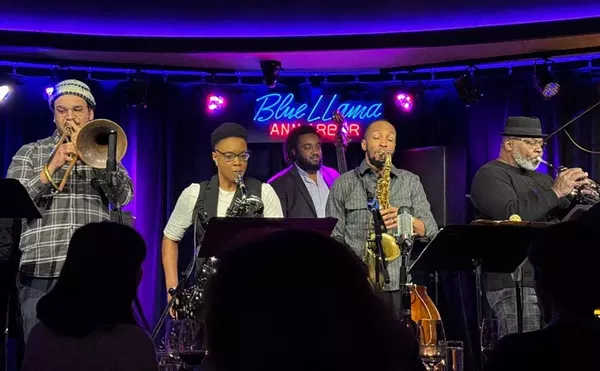We were never about hits," says Gene Simmons referring to the transitory nature of the music industry and where KISS fits in that scheme.
"We clearly are not in fashion now," he continues, "we clearly were not in fashion yesterday, and I promise you, we’re not going to be in fashion tomorrow. Because fashion is something dictated by the few, supposedly, for the masses, and that’s not going to fly."
Welcome to Populism 101, aka KISS: laughing last, laughing loudest. For Gene Simmons, who considers himself an "entertainer" (instead of a musician), there’s always been more to KISS than rock ’n’ roll. They have embodied spectacle and embraced commodification, and, 20 years past their pop culture prime, KISS has grown into an institution unlike any other.
The new film, Detroit Rock City marks the dawn of a new era of KISS and KISS-related products, and demonstrates a boundless avenue for profit: nostalgia. The movie represents a way for KISS (Simmons is a producer, and the band is fully behind the project) to feed memories to their swelling, multigenerational fan base, which encompasses both veterans and more recent converts.
But as cynical at it may appear – especially when seen next to the Aug. 23 debut (on TNT) of the Demon, a WCW wrestler in Simmons’ trademark face paint – this nostalgia marketing taps into the particular KISS paradigm: that a band so unapologetically a business enterprise still resonates in a deep and very personal way with its fans. Just listen to Detroit Rock City’s director, Adam Rifkin, a longtime KISS devotee: "My mom wouldn’t let me see KISS when I was growing up," he explains, "which is one of the reasons I wanted to make this movie. I got a chance to live out the rebelliousness that I only fantasized about when I was a kid.
"They killed goats onstage, they were aligned with the devil," continues Rifkin, relating some of his mother’s not-uncommon fears, "and in the 1970s, KISS was such a rebellious phenomenon, and assaulted parents in a way (that) they did not know what to expect. My mom bought into that. ‘KISS stands for Knights in Satan’s Service. Who knows who’s going to be at that concert?’ It’s very funny now, but at the time, I was very upset."
Today, Gene Simmons is preparing a Saturday morning children’s cartoon show called "KISS Psycho Circus," and all those grown-up fans can make purchases with their very own KISS Visa cards. He’s a modern-day P.T. Barnum, with the heart of a showman and the mind of an entrepreneur. The only shocking thing at this point in the history of KISS would be if someone came up with a marketing angle that Simmons hasn’t already thought of.
"I love it that we have absolutely no credibility," he says, "never wanted it, you keep it, don’t care. Credibility means you’re afraid to do what you really want to do because, what will people think? You’re a fucking coward. You just need to go out there and do it.
"We’re very, very lucky," Simmons continues, "because most bands have an obsolescence factor built into them like cars."
Not KISS. And certainly not in Detroit, where KISS, collectively, are past, present and future rock gods. Their massively successful reunion tour kicked off at Tiger Stadium, and the song "Detroit Rock City" was written by Paul Stanley as a homage to their fans here because, "Detroit took us to their bosoms like that," Simmons says snapping his fingers. "It’s one of my favorite places."
Even the Chicago-born Rifkin concedes that "they’re known for having Detroit as their town." (Despite all the love expressed for Detroit by the filmmakers, most of the movie was shot on the cheap in nearby Ontario.)
Detroit Rock City chronicles a pilgrimage of sorts: In 1978, four teenage boys make a perilous trek to Cobo Hall for the ultimate KISS experience. The movie isn’t about KISS per se, but the experience of KISS. It captures the fan’s point of view filtered through nostalgia, not unlike the recent glam-rock valentine, Velvet Goldmine.
As off-the-wall and broadly comic as Detroit Rock City sometimes gets, it does encapsulate the rock ’n’ roll ethos of rebellion, the essential paradox of coming into your own as an individual amid a crowd of other screaming KISS fans.
"The spirit of the movie is ‘us against them,’" Simmons says, expressing the underlying promise espoused by KISS the corporation.
KISS remains a viable rock empire precisely by embracing its outsider status. You think the old warhorse KISS doesn’t capture the post-everything millennium zeitgeist? Gene Simmons just laughs at you.
"Somebody’s always trying to figure out what KISS means," he says wryly.
"We are probably everybody’s worst nightmare because we don’t care. We’re probably more like cockroaches, you know? We’re going to outlive you all."






